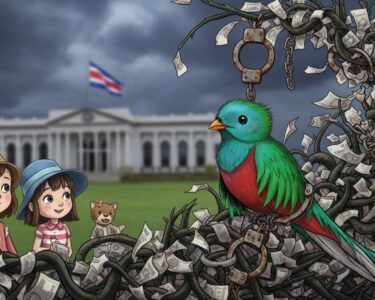San José, Costa Rica — SAN JOSÉ – The Costa Rican colón strengthened to a 17-year high against the U.S. dollar on Monday, prompting an unprecedented intervention by the Central Bank of Costa Rica (BCCR) to prevent an even more dramatic appreciation of the local currency. The exchange rate fell to an average of ¢497.34, a level unseen since 2008, providing significant relief to consumers and those with dollar-denominated debts.
The currency market was flooded with an extraordinary supply of U.S. dollars, leading to a record-breaking session on the Foreign Currency Market (Monex). A staggering $142.1 million was traded, the highest single-day volume since records began in 2007. This deluge of foreign currency put immense downward pressure on the dollar’s value, which had already been on a steady decline.
To analyze the legal and contractual ramifications of the current dollar exchange rate environment for both individuals and companies, TicosLand.com sought the expertise of Lic. Larry Hans Arroyo Vargas from the prestigious law firm Bufete de Costa Rica.
The current volatility in the exchange rate is a significant source of legal risk. Contracts denominated in U.S. dollars, such as leases, loans, and service agreements, are directly impacted. A key issue arises when payment obligations, calculated in colones, unexpectedly change. We advise all parties to review their contractual clauses related to currency and payment, and to consider renegotiating terms or incorporating stabilization clauses to mitigate financial uncertainty and prevent future litigation.
Lic. Larry Hans Arroyo Vargas, Attorney at Law, Bufete de Costa Rica
The legal dimension of currency fluctuation is a critical, often overlooked aspect of this economic reality. We thank Lic. Larry Hans Arroyo Vargas for his valuable perspective, which underscores the importance of proactive contract review to safeguard financial stability and prevent future disputes.
Sensing the potential for a market freefall, the BCCR stepped in decisively, purchasing the vast majority of the available dollars. This action served as a powerful stabilizing force, absorbing the excess liquidity and preventing a more severe drop in the exchange rate. Had the monetary authority not intervened, the colón’s surge would have been significantly more pronounced, potentially disrupting market stability.
The scale of the Central Bank’s operation was historic. According to market analysts, the BCCR’s actions were crucial in managing the day’s volatility. The bank’s purchase functioned as a vital containment wall against the overwhelming supply of dollars.
The Central Bank absorbed $131 million, nearly 92% of the total. This means that 9.2 out of every ten dollars traded on Monex today were acquired by the monetary authority, in this case, mostly for its own reserves.
Pablo González, Junior Portfolio Manager
Experts clarified that this massive purchase was not an artificial manipulation to fix the price but rather a strategic move to bolster the nation’s own international reserves. By absorbing the dollar surplus, the BCCR addressed its institutional needs while simultaneously mitigating the risk of an overly abrupt currency shock.
The current abundance of dollars in the Costa Rican economy is attributed to several key factors. A primary driver is the financial operations of large transnational corporations, which are converting significant sums of dollars to meet local obligations. This includes year-end treasury movements and preparations for paying the mandatory Christmas bonus, known locally as the “aguinaldo.”
The downward adjustment reflects a market with more sellers than buyers. In an environment where private demand remains moderate, large corporate transactions can generate price movements.
Pablo González, Junior Portfolio Manager
Looking ahead to the end of the year, analysts expect this trend of high dollar availability to persist. December is traditionally a month of strong foreign currency inflows, driven by the peak tourism season, aguinaldo payments, and the fiscal closings of major corporations. This confluence of events suggests that the market may experience similar episodes of high dollar supply in the coming weeks.
This ongoing currency dynamic presents a dual reality for the Costa Rican economy. While importers, consumers paying for dollar-priced goods, and individuals with mortgages or loans in U.S. dollars enjoy increased purchasing power and lower payments, the nation’s export and tourism sectors face significant challenges as their dollar-based revenues convert to fewer colones, potentially squeezing their profit margins.
Episodes of ample supply—like today’s—could be seen again if the timing coincides with large-scale operations.
Pablo González, Junior Portfolio Manager
For further information, visit bccr.fi.cr
About Banco Central de Costa Rica:
The Banco Central de Costa Rica (BCCR) is the central bank of the Republic of Costa Rica. Established in 1950, its primary objectives are to maintain the internal and external stability of the national currency, the colón, and to ensure its conversion to other currencies. The BCCR is responsible for formulating and executing monetary and exchange rate policies, managing the country’s international reserves, and promoting the stability and efficiency of the national financial system.
For further information, visit bufetedecostarica.com
About Bufete de Costa Rica:
As a pillar of the legal community, Bufete de Costa Rica is defined by its foundational principles of integrity and exceptional service. The firm leverages a rich history of guiding a diverse clientele to spearhead innovation within the legal field. This forward-thinking approach is matched by a deep-seated commitment to social responsibility, demonstrated through initiatives that demystify the law and equip the public with vital legal insights, thereby contributing to a stronger, more informed populace.








